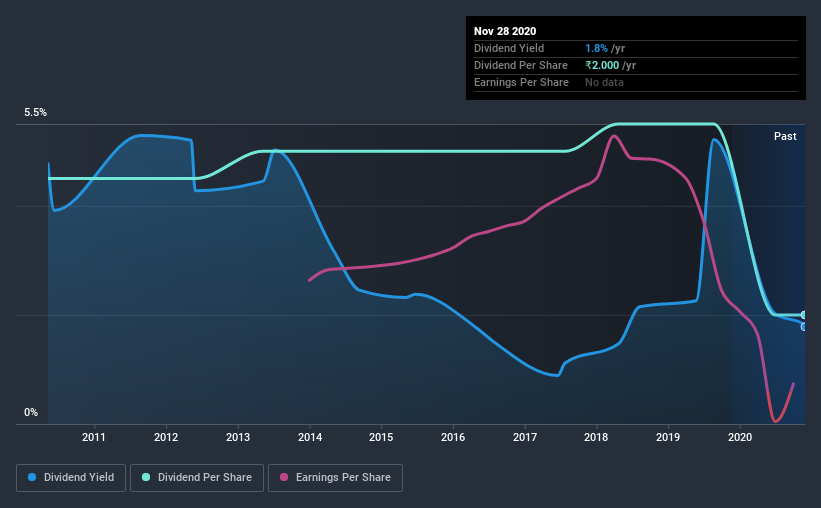- India
- /
- Diversified Financial
- /
- NSEI:GICHSGFIN
Why It Might Not Make Sense To Buy GIC Housing Finance Limited (NSE:GICHSGFIN) For Its Upcoming Dividend

It looks like GIC Housing Finance Limited (NSE:GICHSGFIN) is about to go ex-dividend in the next three days. This means that investors who purchase shares on or after the 3rd of December will not receive the dividend, which will be paid on the 17th of January.
GIC Housing Finance's next dividend payment will be ₹2.00 per share, and in the last 12 months, the company paid a total of ₹2.00 per share. Based on the last year's worth of payments, GIC Housing Finance has a trailing yield of 1.8% on the current stock price of ₹111.9. We love seeing companies pay a dividend, but it's also important to be sure that laying the golden eggs isn't going to kill our golden goose! That's why we should always check whether the dividend payments appear sustainable, and if the company is growing.
See our latest analysis for GIC Housing Finance
Dividends are typically paid out of company income, so if a company pays out more than it earned, its dividend is usually at a higher risk of being cut. GIC Housing Finance paid out 195% of profit in the past year, which we think is typically not sustainable unless there are mitigating characteristics such as unusually strong cash flow or a large cash balance.
Generally, the higher a company's payout ratio, the more the dividend is at risk of being reduced.
Click here to see how much of its profit GIC Housing Finance paid out over the last 12 months.

Have Earnings And Dividends Been Growing?
Companies with falling earnings are riskier for dividend shareholders. If earnings decline and the company is forced to cut its dividend, investors could watch the value of their investment go up in smoke. GIC Housing Finance's earnings have collapsed faster than Wile E Coyote's schemes to trap the Road Runner; down a tremendous 44% a year over the past five years.
Many investors will assess a company's dividend performance by evaluating how much the dividend payments have changed over time. GIC Housing Finance's dividend payments per share have declined at 7.8% per year on average over the past 10 years, which is uninspiring. It's never nice to see earnings and dividends falling, but at least management has cut the dividend rather than potentially risk the company's health in an attempt to maintain it.
To Sum It Up
From a dividend perspective, should investors buy or avoid GIC Housing Finance? Not only are earnings per share shrinking, but GIC Housing Finance is paying out a disconcertingly high percentage of its profit as dividends. Generally we think dividend investors should avoid businesses in this situation, as high payout ratios and declining earnings can lead to the dividend being cut. This is not an overtly appealing combination of characteristics, and we're just not that interested in this company's dividend.
So if you're still interested in GIC Housing Finance despite it's poor dividend qualities, you should be well informed on some of the risks facing this stock. Our analysis shows 4 warning signs for GIC Housing Finance that we strongly recommend you have a look at before investing in the company.
A common investment mistake is buying the first interesting stock you see. Here you can find a list of promising dividend stocks with a greater than 2% yield and an upcoming dividend.
If you’re looking to trade GIC Housing Finance, open an account with the lowest-cost* platform trusted by professionals, Interactive Brokers. Their clients from over 200 countries and territories trade stocks, options, futures, forex, bonds and funds worldwide from a single integrated account. Promoted
New: Manage All Your Stock Portfolios in One Place
We've created the ultimate portfolio companion for stock investors, and it's free.
• Connect an unlimited number of Portfolios and see your total in one currency
• Be alerted to new Warning Signs or Risks via email or mobile
• Track the Fair Value of your stocks
This article by Simply Wall St is general in nature. It does not constitute a recommendation to buy or sell any stock, and does not take account of your objectives, or your financial situation. We aim to bring you long-term focused analysis driven by fundamental data. Note that our analysis may not factor in the latest price-sensitive company announcements or qualitative material. Simply Wall St has no position in any stocks mentioned.
*Interactive Brokers Rated Lowest Cost Broker by StockBrokers.com Annual Online Review 2020
Have feedback on this article? Concerned about the content? Get in touch with us directly. Alternatively, email editorial-team@simplywallst.com.
About NSEI:GICHSGFIN
Average dividend payer and fair value.

